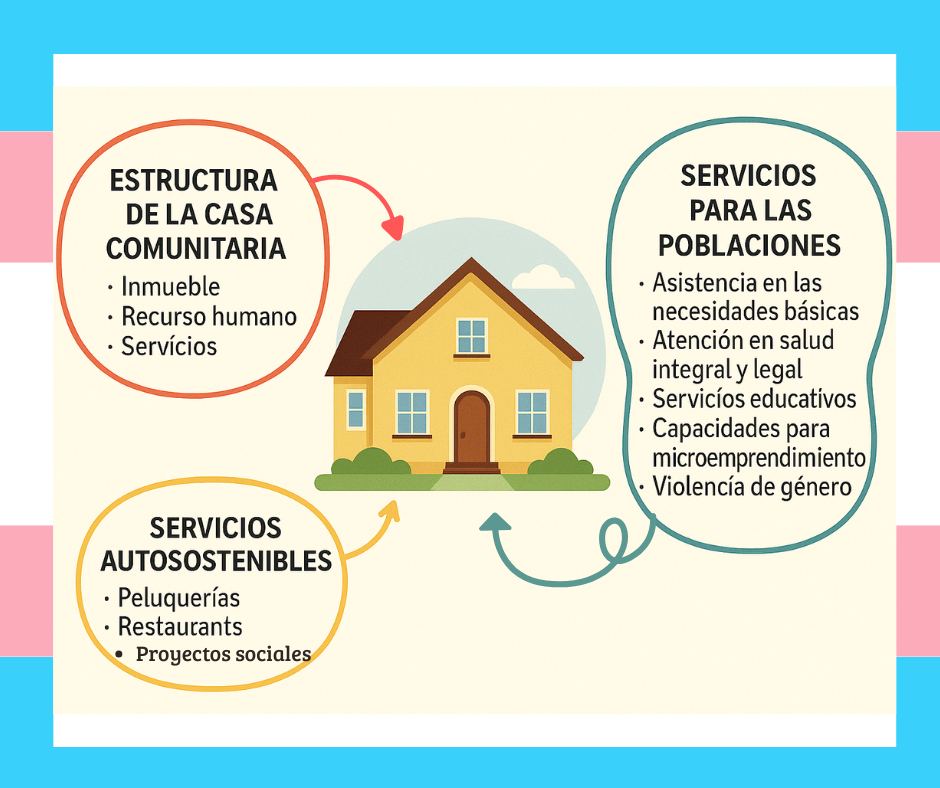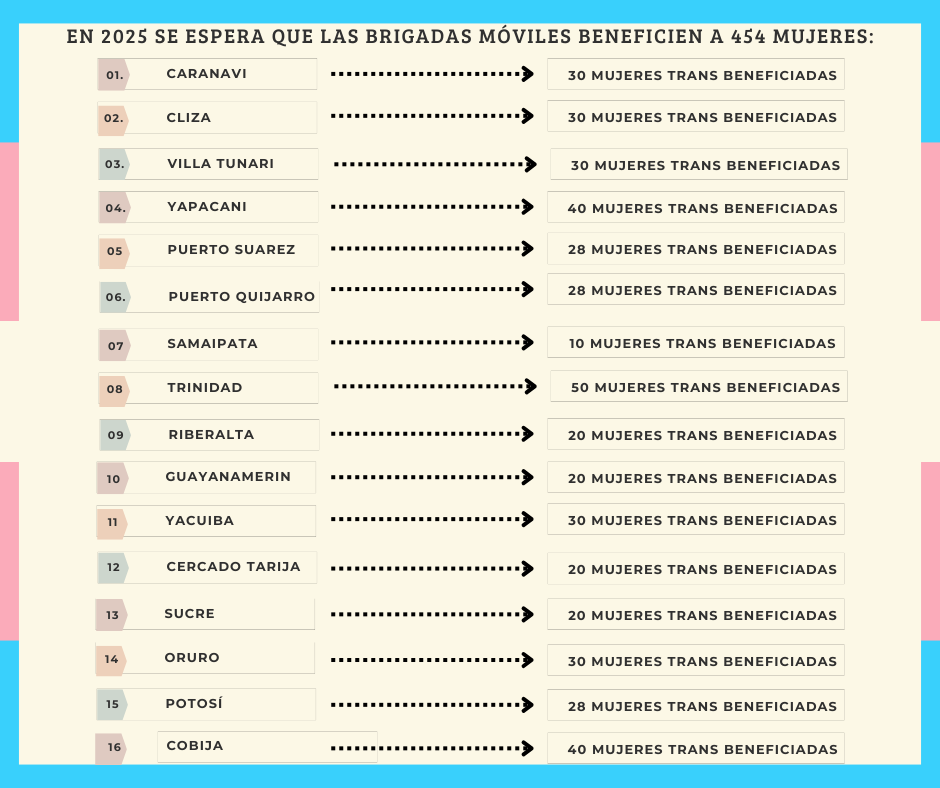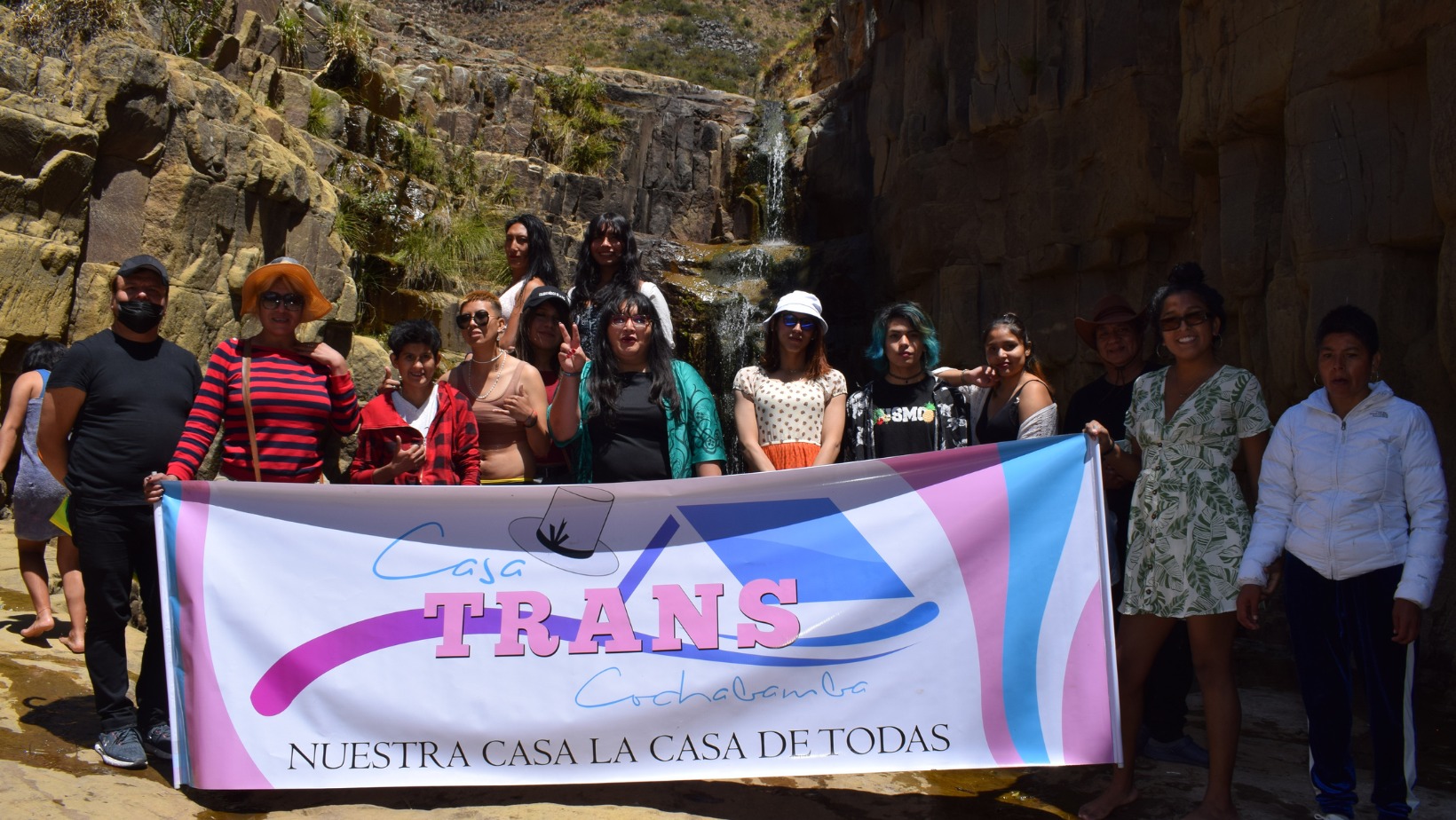Key shelters for the diverse population and those seeking support, the Trans Houses in Bolivia provide comprehensive care and promote the defense of the rights of the trans population. Journalist Brenda Villalba tells the story in this article created with a Gender Equity Reporting Grant from the Fund for Solutions Journalism in Latin America, an initiative of El Colectivo 506, thanks to a donation from the Burgess Fund. The article was published by RedFem Bolivia on April 27 and Muy Waso on May 9 2025 and adapted and translated here by El Colectivo 506, for co-publication. Please note that the English version has been edited for clarity and regional context.
In one hand, she holds a red book. Golden letters spell out the author and title, “Truman Capote. In Cold Blood.” As we talk about the text, she tells me, almost like a confession, that “it’s for a university class.” Our conversation flows under an intense sun and a wind that ruffles Carolina’s black hair, making her black dress with thin white stripes vibrate, almost at the same rhythm as a small flag she carries in her other hand: a rainbow with blue, white and pink stripes. A badge of her struggle, her story, her dreams and, above all, her identity as a trans woman.
Carolina is one of the first beneficiaries and collaborators in the construction of the Trans House, or Casa Trans, in Cochabamba. It’s an institution that not only responds to state gaps by offering a comprehensive health service to the trans population—medical, psychological and legal—but is also transforming the lives of trans women and sexual-gender diversities.
According to Carolina, the Casa Trans changed her vision of herself, of her companions, and of a possible future. Now, she wants to “achieve those life goals that many people have, but that for us was very difficult to think about,” she says as a slight smile plays across her face. She looks towards the ground, as if projecting some old memory, like a hologram that creates an atmosphere of intimacy that includes me, too.
In Bolivia, the trans community and other sex-gender diversities suffer from discrimination and inequalities marked by social stigmas and prejudices that translate into violence, both social and institutional.
The 2023 advocacy report “Unequal Before the Law: Results and analysis of the 1st virtual survey for people with diverse sexual orientation, gender identity and expression in Bolivia” estimated that 64% of trans people had suffered some type of discrimination. Of these, very few came forward to report the discrimination, because of distrust of the judicial system.
This reality is directly linked to the reduction in life expectancy of trans women in Bolivia. According to Luna Sharlotte Húmerez, president of the Organization of Transvestites, Transgenders and Transsexuals of Bolivia and coordinator of the Casa Trans in La Paz, the life expectancy of a trans woman in Bolivia is just 45 years. This is due to multiple factors, including hate crimes—the newspaper Opinión states that there were 80 cases in the last decade, many of which are not investigated due to lack of family complaints or the inaction of the judicial system. Other factors include the risks of sex work; lack of integration into educational systems and job markets; and limited state protection.
María Chantal Cuéllar, coordinator of the Casa Trans in Cochabamba, points out that within the trans community, that the violation of rights of trans women is particularly profound: these women face discrimination for leaving the heteronormative framework or gender binary, as well as all of the discrimination faced by any woman in a sexist society, reinforced by religious discourse.
In the lives of trans women, these social barriers translate into a lack of opportunities. However, for Carolina, the Casa Trans counteracted this by providing support so that she can continue fighting for her dreams and change the realities of others in her community.
She says the shelter allowed her to “take hold of this idea, this way of thinking: that we can change society and exert influence in order for the government to become aware of its shortcomings.”
More than a house
The Casas Trans emerged as an idea in 2020, in the department of Santa Cruz de la Sierra, home to one of Bolivia’s largest trans populations. Kerana Saucedo and Muriel Arteaga, now the coordinators of this city’s Casa Trans, were at the head of a local trans women’s organization. They say that in the face of discrimination and aggression in public spaces, they chose to work towards the creation of a shelter as a way to establish a safe space: a space to meet without fear. A refuge created by them and for them.
From its origin, they envisioned the project as more than just a building and its services. The founders imagined it as a commitment to transform the lives of trans women in Bolivia. They got started by renting a space, using common savings, a fundraising festival, and the support of a colleague committed to the cause. Little by little, the house began to take shape: an old refrigerator, a mirror, a few chairs and, above all, the warmth that each person brought with them. In 2024 alone, the Santa Cruz Trans House served 1,110 trans women through its Peer Educator Promoters, who provide information and conduct health testing.
In 2021, the COVID-19 pandemic further aggravated the challenges faced by the trans community. Many trans women who depended on sex work or small businesses were severely affected. An assessment carried out that year revealed that 35% were evicted from their homes or rentals, 62% suffered some type of discrimination, and 76% significantly lost income. Access to health, food and basic services became critical. Many were not even able to go to medical centers, and government aid was inaccessible to those who did not have legal documents or faced bureaucratic obstacles.
This assessment, “A new reality: situation of the transfeminine population that carries out sex work in Bolivia under the situation imposed by the COVID-19 pandemic,” was prepared by the Trans Feminist Movement and was a fundamental piece in achieving subsequent financing. Its presentation to the Global Fund to Fight HIV/AIDS—through the Country Coordination Mechanism and with the support of UNDP and the Un Nuevo Camino Association (Asuncami) as implementing partners—allowed access to the financing necessary to solidify the Casa Trans of Santa Cruz and open new houses in three other cities.
According to Kerana, the Santa Cruz Casa Trans quickly became a reference for other trans women in the country, which allowed the model to be replicated in three new cities: Cochabamba, La Paz, and Trinidad, in the province of Beni. What’s more, trans women from other countries—such as Peru—began to visit the space, interested in learning about the project.
After a year of operation, the founders began to consider new ways to transform the lives of the trans population. As a result, the Casas Trans are no longer just spaces for assistance, focused on psychological, medical or legal services. They now define themselves as platforms for collective emancipation. According to Chantal Cuellar, these shelters have become places where the trans struggle in Bolivia is redefined from an intersectional, community and deeply human approach.
Along these lines, a change in focus was proposed in 2023: the Casa Trans would not only provide shelter and basic care, but would also begin to promote job opportunities, access to education, defense of rights, and the comprehensive empowerment of trans people. In addition, a data systematization process was initiated to start recording and making visible information about this population, based on the services provided.

The impact of each house has grown. The Cochabamba Casa Trans served 457 people in 2024, and the La Paz House served 1,012 people, only counting the people directly served by Peer Educator Promoters. However, that number transforms with the changes of the project and the different services.
A watershed moment for trans women
As I climb to the second floor, the sound of voices on a television program become increasingly clear, the vibrations coursing through my body. As I come through the door, I can see the main living area: a television in the background, and a dining room with 12 chairs. Later, this space would become impossible to separate from the story of Carolina. In this room, she and her friends celebrated the birthdays of many trans women who, until then, had never had a party.
Carolina’s words take me back to that warm space that the Casa Trans represents for her: a place of fellowship, but also of constant struggle for rights, political movement, and empowerment.
“For me it was a total change,” she says, her voice firm. “This is a place where we are safe, where we can speak without fear, without filters. It is like finding the guidance that we never had in our homes.” She adds that “it is like a first home, or the replacement of one that was denied.”
The 2022 research paper “Social situation of trans people in the city of La Paz“ found that “an early departure from the family nucleus occurs: trans people usually reveal their identity between 15 and 18 years of age, an age at which they have not yet completed their school studies.”
This is one of the leading causes of reduced educational and employment opportunities for the trans population. According to the study “Data on bullying due to homophobia and transphobia in Bolivia,” at least 72% of this population drops out of high school. In many cases, this leads trans women to resort to forms of subsistence such as sex work. It is estimated that at least 80% are dedicated to this activity, while 47.3% earn less than 1,000 bolivianos per month, according to data from the defense report. That’s about US $144.
In 2018, after being elected Trans Queen and beginning her transition, Carolina decided to leave home. That same year she met Chantal, who integrated her into the leadership of the Cochabamba Casa Trans project. Before that, she was already working in community health: distributing condoms and promoting HIV testing—but when she got involved with Casa Trans, she got involved in serving the population in other ways. “We never thought about other needs, and when we created the Casa Trans… little by little, it made us rethink our areas of work,” she says.
These spaces have become references thanks to the various activities they have promoted, but, above all, the rethinking of trans women’s spaces. “A trans woman can be a lawyer, she can be at university, she can run an organization,” says Chantal.
This fuels the drive to support professionalization and job opportunities within the Casa Trans. The Casas have generated entrepreneurial spaces that contribute to the sustainability of the project. In Santa Cruz, the Casa Trans has a beauty salon and restaurant, where trans women work; the Casa Trans in La Paz has a beauty salon; and in Cochabamba, they focus on developing social projects that bring in funding. In addition to generating income, these projects create new opportunities for the target population, The Casas also hold workshops to promote trans entrepreneurship.
“On a personal level, all of this has strengthened so much within me. I have participated in these workshops, and I have also facilitated them,” Carolina recalls. Of course, for an enterprise to be successful, it must overcome other obstacles such as the structural discrimination that persists towards the trans population. Still, the Casas Trans inspire participants to dream of possible futures.
For example, between 2021 and 2022, the Casa Trans Santa Cruz joined forces with the Kerana organization and the Rebeldía Collective, to obtain 11 academic scholarships for trans participants, with ministerial support.
In a homey corner, between sofas and books, Ninoska Flores—the psychologist from Casa Trans Cochabamba—summarizes the impact of the house’s programming. “Here the girls have started to think: ‘I can go to university, I can graduate, I can start a business, I can make TikToks, I can present myself as a model, I can start making makeup blogs,’” she explains. “They have started to think about things that they didn’t before.”
A third stage of specialization: community centers
On a Thursday afternoon, I returned to Casa Trans Cochabamba for another visit. On the left side of the entry, there’s a small rectangle that indicates that I have reached the destination. The stairs lead me up to the main room, where many of the girls are working on a new project. They tell me that the doctor is waiting for me for the interview.
On the third floor of that house, a bright living room welcomes me. A stretcher next to the doctor’s desk reveals the purpose of the place: to offer basic medical check-ups. Although each Casa Trans is a little different, each one has a medical space like this, all with the same purpose: to provide health services to the trans population.
This initiative represents a successful expansion of the Casa Trans model and has given rise to the so-called Trans Community Centers, implemented in 2024 with the support of the Ministry of Health and Sports, the United Nations Development Program (UNDP), and the Global Fund. The Trans Community Centers have been added to the four existing Casa Trans in Bolivia; their purpose goes far beyond offering medical check-ups, HIV and other STD tests, or distributing condoms and lubricants. Their main mission is to provide clear and accessible information to their target population on fundamental topics related to health and transition processes—and to facilitate their effective inclusion in the country’s Unified Health System (SUS).
On a Thursday afternoon, I returned to Casa Trans Cochabamba for another visit. On the left side of the entry, there’s a small rectangle that indicates that I have reached the destination. The stairs lead me up to the main room, where many of the girls are working on a new project. They tell me that the doctor is waiting for me for the interview.
On the third floor of that house, a bright living room welcomes me. A stretcher next to the doctor’s desk reveals the purpose of the place: to offer basic medical check-ups. Although each Casa Trans is a little different, each one has a medical space like this, all with the same purpose: to provide health services to the trans population.
This initiative represents a successful expansion of the Casa Trans model and has given rise to the so-called Trans Community Centers, implemented in 2024 with the support of the Ministry of Health and Sports, the United Nations Development Program (UNDP), and the Global Fund. The Trans Community Centers have been added to the four existing Casa Trans in Bolivia; their purpose goes far beyond offering medical check-ups, HIV and other STD tests, or distributing condoms and lubricants. Their main mission is to provide clear and accessible information to their target population on fundamental topics related to health and transition processes—and to facilitate their effective inclusion in the country’s Unified Health System (SUS).

An informed decision
Many members of the trans population face steep obstacles, and many feel afraid when going to health centers. Chantal points out that while transsexuality and transgender identity have been depathologized in Bolivia, acts of discrimination continue. Furthermore, specialized medical training for trans care is not available in bolivia. At the Casas Trans, discussions are underway to address this and improve care.
Carolina’s transition process was marked by these social barriers. For several months, she had to face not only the lack of knowledge of the medical staff themselves but also her own lack of knowledge. “I wish.. that I had acquired more information” early on, she says.
The firm decision to undergo surgery took her on a journey through four departments of Bolivia. Seeking more information about the surgical procedure, between the lonely decision and the constant fear, she found support in other trans women who guided her along the way. “I had the operation without any financial support, not even motivational support from my family. And I needed that, because I started crying. I was alone… but still, happy,” she remembers.
Dr. Gabriela Pereira, a doctor at the Cochabamba Trans Community Center, emphasizes the importance of working with Peer Educator Promoters (PEP). They link trans women to the health system, but also provide information and one-on-one support.
“When we provide service with warmth, with them as a bridge, it is much easier for our colleagues to come closer, tell us what they need and access quality treatment,” she says.
Having a health specialist and a psychologist who belong to the trans community, as in the case of Casa Trans Santa Cruz, or who work with a gender perspective, as in the case of Casa Trans Cochabamba, makes possible comprehensive care for processes such as transition, but also breaks the stereotype of how a trans woman should look. The Casas seek to support informed decisions and break with the old canons of femininity, sparking conversation about diversity within the trans population itself.
“There are colleagues who previously did not feel trans because they said: ‘I haven’t made my name change yet, so I’m not a trans woman.’ And that’s where we intervene. We understood that within the broad experience that is gender identity, there are many ways of being,” Carolina tells me.
Misinformation also affects the families of trans women. According to a 2022 study by Eimy Tornero, most families with a trans member deal with changes in their perception of that family member, but also worry about how this decision could put that person’s lives at risk. This can generate intense fear. That’s why the Casas Trans also work to include and educate the families of their beneficiaries.
“We have come to understand that transitioning is not an individual process, but rather a systemic process. It is a community process,” says Flores, the psychologist from the Cochabamba community center. “The person who is in the process of transition isn’t the only one who transitions. So does the family, siblings, parents, partners, colleagues. All the people around them are following that process, and the family is the one that is most affected. Something that also happens is that there is grieving because in the case of trans girls, the son you had no longer exists: from now on, you have a daughter.”
Carolina sees this initiative as a structural achievement for other women. She remembers that once, at the beginning of her transition, she had to take a trans woman home to explain to her parents what it means to be a trans woman. Each memory she describes seems to hover between good and bad, bitter and sweet. As I follow her gestures, I find myself entering into the nuance of her history and her hope. She is convinced that today, the path is a little clearer thanks to those efforts.
“There was no way to get acceptance from my family,” she says. “I think that with a guide, it would have been a little easier or more bearable to be able to mention what it is like to be a trans woman… If there had been a place like the Casa Trans, maybe my life would have been less complicated.”
While significant challenges remain, the Casas Trans have established themselves as spaces for fighting for human rights, and a reference point for diversity. In La Paz, for example, after multiple rejections for rental applications because property owners expressed an opinion that it would be used as a “nightclub,” the constant work of trans women eventually created a space that’s valued and respected by the community.
The Casas Trans are not only aimed at the diverse population: they also function as support spaces open to the general public. In her office, decorated with photos, trans flags and memories of shared struggles, Chantal stops to think as her eyes pass over one image after another. With a broad smile, shares a scene that for her marks a before and after.
“Something that has brought us great joy this year is seeing that some mothers have begun bringing their daughters to the Homes to seek information about the transgender population, and to help them process and support their son or daughter through the transition,” she says. “At first, they arrive with some fear, but then they feel welcomed. We explain to them that this is not just a center for services, but a home where they can find support and guidance.”





